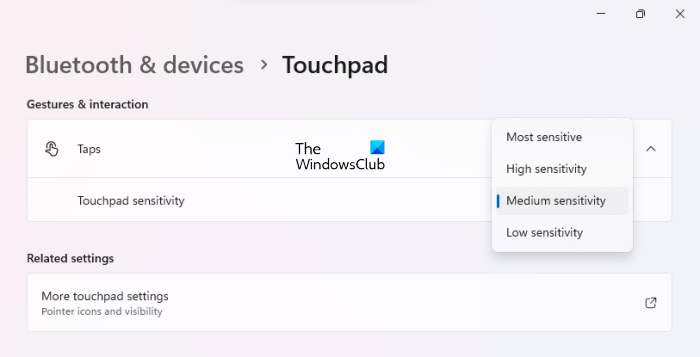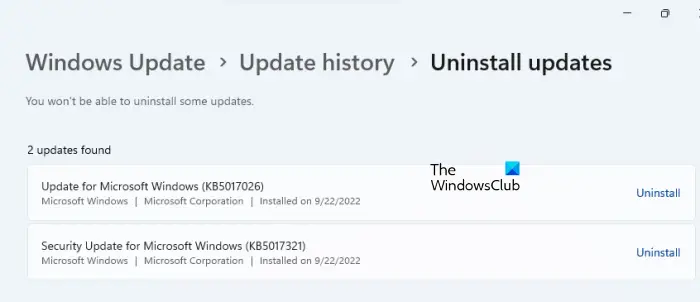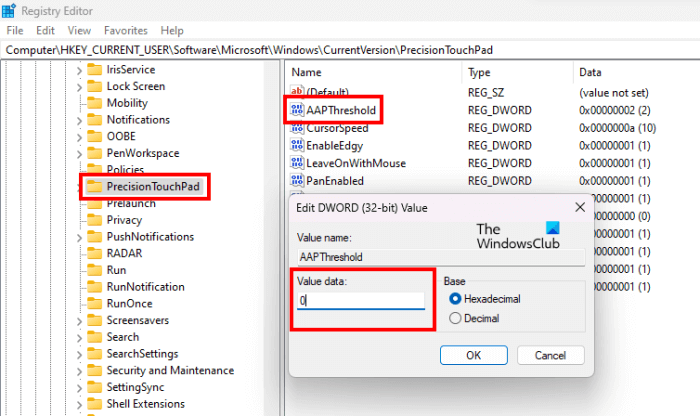If for some reason your laptop touchpad responds slowly or you are experiencing delay, this post will show you how to fix touchpad delay on Windows 11/10. Among the users who experienced this issue on their laptops, some reported that the touchpad delay occurred after installing the latest Windows Update. However, there are many other causes that can trigger this issue. You can also experience a touchpad delay due to hardware or software issues.

Why is my touchpad not moving smoothly?
There are many reasons why your touchpad is not moving smoothly or you are experiencing a touchpad delay on your Windows computer. Your touchpad driver might have been damaged or someone has changed your touchpad sensitivity in Windows Settings. Apart from that, hardware issues are also responsible for touchpad delay.
How to fix Touchpad delay on Windows 11/10
The following solutions will help you fix the touchpad delay on Windows 11/10.
- Run Hardware and Devices Troubleshooter
- Change your touchpad sensitivity and cursor speed
- Uninstall the latest Windows Update
- Uninstall and reinstall your touchpad driver
- Modify Windows Registry
- Change the Synaptics key in Registry (solution for Synaptics touchpad users)
Below, we have explained all these solutions in detail.
1] Run Hardware and Devices Troubleshooter
The Hardware and Devices Troubleshooter helps Windows users fix hardware-related problems on their systems. Run the Hardware and Devices Troubleshooter and see if it helps you resolve the touchpad delay. To run the troubleshooter, you have to execute the following command in Command Prompt.
msdt.exe -id DeviceDiagnostic
2] Change the touchpad sensitivity and cursor speed
Windows 11/10 has a feature to control the touchpad sensitivity. If you are using a shared laptop, it is possible that someone has changed your laptop’s touchpad sensitivity. You can check this in Windows 11/10 Settings. The following steps will help you with that:

- Click on Windows 11/10 Search and type Touchpad settings. Click on the desired option in the search results.
- Click on the drop-down to change the Touchpad sensitivity. In Windows 11, first, expand the Taps tab, then change the touchpad sensitivity.
- Now, click on Windows 11/10 Search again and type Mouse settings. Click on the desired option in the search results.
- Move the slider to change the Mouse pointer speed.
3] Uninstall the latest Windows Update

Some users have reported that the issue started occurring after installing the latest Windows Update. Installing the latest Windows Updates is mandatory because it protects your system from cyber threats. But in some cases, Windows Updates may create issues on a system. That’s why Microsoft has provided a feature to uninstall Windows Update. If you are among such users, you can take advantage of this feature and uninstall the latest Windows Update.
4] Uninstall and reinstall your touchpad driver
One possible cause of this problem is a corrupted touchpad driver. Open the Device Manager and expand the Mouse and other pointing devices node. Right-click on your touchpad driver and select Uninstall device. After uninstalling it, restart your laptop. Windows will automatically install the missing drivers on the restart.
5] Modify Windows Registry
If the problem still persists, modify Windows Registry. Windows Registry is a hierarchical database of Windows OS. Hence, incorrect changes to it can lead to serious errors in your system. Therefore, we suggest you create a System Restore Point and backup Windows Registry before proceeding.
Click on Windows Search and type Registry Editor. Select the desired option from the search results. You will receive a UAC prompt. Click Yes.

Copy the following path and paste it into the address bar of the Registry Editor. Press Enter.
HKEY_CURRENT_USER\Software\Microsoft\Windows\CurrentVersion\PrecisionTouchpad
Make sure that the PrecisionTouchpad key is selected from the left side. Now, double-click on the AAPThreshold Value on the right side.
Type 0 in its Value Data and click OK to save the changes. Restart your computer.
6] Change the Synaptics key in Registry (solution for Synaptics touchpad users)
If you have a Synaptics touchpad, change the Synaptics key in Registry. But before you proceed, create a System Restore Point and back up your Registry. Now, follow the instructions written below:
Open the Registry Editor. Copy the following path and paste it into the address bar of the Registry Editor. After that, hit Enter.
HKEY_LOCAL_MACHINE\SOFTWARE\Synaptics\SynTP\Defaults
Make sure that the Defaults key is selected on the left side. Now, look for the PalmKms value on the right side. You may find multiple entries. Double-click on each entry and enter 0 in Value Data. After that, click OK.
Now, go to the following path in the Registry Editor.
HKEY_LOCAL_MACHINE\SOFTWARE\Synaptics\SynTP\Install
Make sure that the Install key is selected on the left side. Look for the DeleteUserSettingsOnUpgrade value on the right side and double-click on it. Enter 0 in its Value Data and click OK.
When you are done, restart your laptop. This should fix the issue.
How do I fix my touchpad speed?
Windows 11/10 allows users to change the mouse pointer speed as per their requirements. This can be done by moving the slider in the touchpad or mouse settings. If you have noticed a change in your touchpad speed, it is possible that someone has changed it in settings. To fix your touchpad speed, open Mouse Settings and move the slider.
I hope this helps.
Read next: TouchPad not working on Windows 11/10.
Leave a Reply